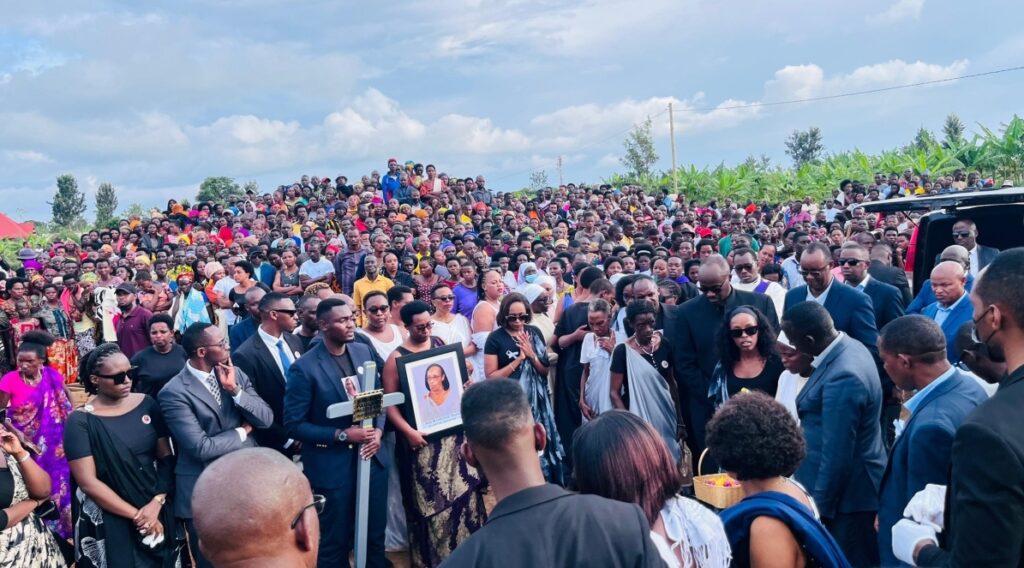
by Emmanuel Nkangura, The New Times
Grief engulfed Rukumberi Sector, in Ngoma District, on November 21 as hundreds gathered to bid farewell to Pauline Nduwamungu, a 66-year-old genocide survivor brutally murdered and beheaded on November 14.
The brutal murder of Nduwamungu, a mother of three who was a nutritionist at Rukoma Health Center, generated national outrage. Rwanda Investigation Bureau (RIB) reported that the main suspect confessed to killing her and discarding her head in a pit latrine. Several other suspects were arrested. Alphonsine Mukarugema, the Vice President of the Association of Genocide Widows, AVEGA Agahozo, earlier said that the murder was a cruel blow to all genocide survivors.
During her funeral, Callixte Kabandana, a representative of Ibuka, the umbrella body of genocide survivors’ associations, warned genocide fugitives who, he said, are using their financial power to target elderly survivors of the 1994 genocide against the Tutsi in Rwanda.
He said that some genocide fugitives are funding local actors to intimidate, or kill, elderly survivors who were key witnesses to their crimes during the Gacaca courts.
“These fugitives committed unimaginable crimes during the genocide, yet they continue to evade justice by living comfortably in other countries,” Kabandana said.
“What is even more troubling is that some are reportedly using financial means to lobby for their return to Rwanda without being held accountable for their actions. “These perpetrators are financing local actors to intimidate, harm, or even kill elderly survivors, many of whom are key witnesses to the atrocities committed during the genocide. Their goal is clear: to erase evidence and eliminate those who could hold them accountable upon their return.”
The warning comes as cases of attacks on elderly survivors have been reported in various parts of the country. A number of survivors, especially the elderly, live in rural areas where they are easy targets for intimidation and violence, according to Ibuka.
RIB figures indicated an increase in crimes related to concealing, destroying, eliminating, or degrading evidence or information related to the Genocide. These crimes had risen by 120 percent, with related cases rising from 44 in 2019 to 97 in 2023.
“Local residents must not allow themselves to be used as tools for these perpetrators,” Kabandana warned.
“Accepting money to harm survivors is not just a betrayal of justice but a betrayal of our nation’s shared values of unity and reconciliation.”
Rwanda has issued numerous international arrest warrants for genocide fugitives, but extraditing them remains a challenge.
Many genocide suspects secured asylum or citizenship in foreign countries, making legal proceedings complicated.
Ibuka has called on host countries to cooperate in holding genocide suspects accountable, either by extraditing them to Rwanda or prosecuting them locally. The organization also urged international bodies to prevent fugitives from exploiting gaps in the justice system to escape accountability.
According to data from the National Public Prosecution Authority (NPPA), as of December 2023, Rwanda had issued more than 1,000 indictments against genocide suspects in 33 countries and the International Criminal Police Organization (INTERPOL) secretariat.
Genocide survivors, many of whom still carry the scars of the atrocities, have expressed frustration at the impunity enjoyed by fugitives. Marie Claire Mukakamanzi, a survivor in Ngoma District, said it is painful to hear about perpetrators attempting to eliminate elderly survivors.
“We lost our families, our homes, and everything we knew during the genocide,” Mukamurera said.
“Justice is the least we can ask for. Bringing to book these individuals will honour the memory of those we lost.”
buka is calling upon Rwandans to stay vigilant and report any suspicious activities involving fugitives or their accomplices.
The organization also urged international bodies and local communities to work together in ensuring that justice is served.
“Protecting survivors is not just about their safety—it is about preserving the dignity of our nation,” Kabandana said.
“We must stand firm in ensuring these crimes do not go unanswered.”
